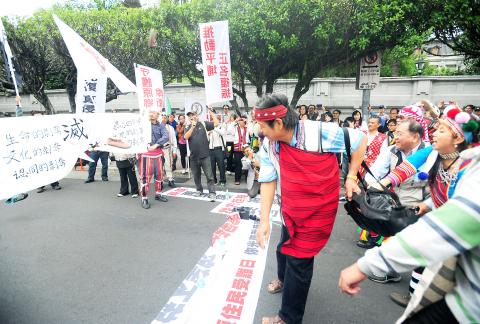Far from inspiring respect, Retrocession Day triggers entirely different feelings among Taiwanese and Aborigines despite the government’s promotion of the event for more than 60 years, advocates said yesterday.
The national memorial day in commemoration of Taiwan’s “return to the motherland” is a part of Chinese Nationalist Party (KMT) propaganda and a distortion of history, former Academia Historica president Chang Yen-hsien (張炎憲) said.
“Retrocession is a word used by rulers. For Taiwan and the Taiwanese, retrocession couldn’t be further from the truth, as the KMT authoritarian regime never cared too much about the people and the island in the past,” Chang told a seminar yesterday.

Photo: Wang Yi-sung, Taipei Times
The timing of the seminar, organized by the Wu San-lien Foundation for Taiwan Historical Materials, was being held on the Retrocession Day to play up the irony of the KMT’s propaganda, Chang said.
It would be difficult for Taiwanese to appreciate and commemorate a day that marked the beginning of their suffering and oppression under the then-KMT regime, which sought to purge Taiwan’s history, culture and language, he said.
The KMT regime’s effort to eliminate Hoklo (commonly known as Taiwanese) was a perfect example of its oppression of Taiwanese, Li Kang-khioh Taiwanese Foundation director-general Tan Hong-hui (陳豐惠) said.
Japan did not prohibit the use of Hoklo completely until 1937, 42 years after the beginning of its colonization of Taiwan, while the KMT regime imposed its Mandarin-only policy immediately after its exile to Taiwan in 1949.
The move, implemented over the past 64 years, had a damaging effect not only on the Hoklo language, but also on Taiwanese identity, Tan said.
She expressed concern about the survival of Hoklo, saying that despite the efforts by the former Democratic Progressive Party (DPP) administration to revive the use of the mother tongue from 2000 to 2008, it “might be too late” to reverse the trend as most young people cannot speak Hoklo well and have been reluctant to speak the language.
“To me, the retrocession was Taiwan fall into alien hands,” she said.
New Taipei City Councilor Icyang Parod agreed.
An Amis who formerly served as head of the Council of Indigenous Affairs in the DPP administration, Icyang said the day should only be remembered as another start to the suffering of Aborigines under foreign rule.
The Japanese nationalized almost all Aboriginal lands and the KMT regime followed suit by maintaining its rights to expropriate Aboriginal territory for any purpose the regime deemed as “serving the public good,” he said.
He added that the KMT had ignored a previous policy that tried to return the lands and autonomous rights to Aborigines after its return to power in 2008.
Up to 45 percent of the 500,000 Aborigines in Taiwan now live in urban areas because they have trouble making a living in their hometowns after their traditional territory was taken away, he said.
“Oct. 25, 1945 represented prolonged suffering rather than joy for the Aborigines. To us, that day only meant achange of alien regime,” he said.

ENTERTAINERS IN CHINA: Taiwanese generally back the government being firm on infiltration and ‘united front’ work,’ the Asia-Pacific Elite Interchange Association said Most people support the government probing Taiwanese entertainers for allegedly “amplifying” the Chinese Communist Party’s propaganda, a survey conducted by the Asia-Pacific Elite Interchange Association showed on Friday. Public support stood at 56.4 percent for action by the Mainland Affairs Council and the Ministry of Culture to enhance scrutiny on Taiwanese performers and artists who have developed careers in China while allegedly adhering to the narrative of Beijing’s propaganda that denigrates or harms Taiwanese sovereignty, the poll showed. Thirty-three percent did not support the action, it showed. The poll showed that 51.5 percent of respondents supported the government’s investigation into Taiwanese who have

South Korean K-pop girl group Blackpink are to make Kaohsiung the first stop on their Asia tour when they perform at Kaohsiung National Stadium on Oct. 18 and 19, the event organizer said yesterday. The upcoming performances will also make Blackpink the first girl group ever to perform twice at the stadium. It will be the group’s third visit to Taiwan to stage a concert. The last time Blackpink held a concert in the city was in March 2023. Their first concert in Taiwan was on March 3, 2019, at NTSU Arena (Linkou Arena). The group’s 2022-2023 “Born Pink” tour set a

A Philippine official has denied allegations of mistreatment of crew members during Philippine authorities’ boarding of a Taiwanese fishing vessel on Monday. Philippine Bureau of Fisheries and Aquatic Resources (BFAR) spokesman Nazario Briguera on Friday said that BFAR law enforcement officers “observed the proper boarding protocols” when they boarded the Taiwanese vessel Sheng Yu Feng (昇漁豐號) and towed it to Basco Port in the Philippines. Briguera’s comments came a day after the Taiwanese captain of the Sheng Yu Feng, Chen Tsung-tun (陳宗頓), held a news conference in Pingtung County and accused the Philippine authorities of mistreatment during the boarding of

88.2 PERCENT INCREASE: The variants driving the current outbreak are not causing more severe symptoms, but are ‘more contagious’ than previous variants, an expert said Number of COVID-19 cases in the nation is surging, with the Centers for Disease Control (CDC) describing the ongoing wave of infections as “rapid and intense,” and projecting that the outbreak would continue through the end of July. A total of 19,097 outpatient and emergency visits related to COVID-19 were reported from May 11 to Saturday last week, an 88.2 percent increase from the previous week’s 10,149 visits, CDC data showed. The nearly 90 percent surge in case numbers also marks the sixth consecutive weekly increase, although the total remains below the 23,778 recorded during the same period last year,